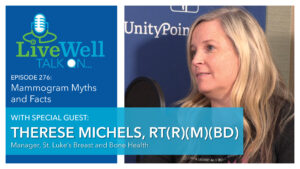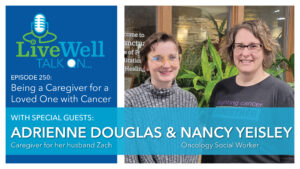Dr. William Fusselman is an expert at treating colon cancer. But he’d rather patients didn’t need his services at all.
“Colon cancer is so preventable and treatable,” emphasizes Dr. Fusselman, of Physicians’ Clinic of Iowa Hematology & Oncology. “ In many cases it’s avoidable by making lifestyle changes like exercise and a healthy diet. And if it does develop, if we catch it early, surgery is all that’s required. The cancer is gone.”
The key is early detection. Dr. Fusselman says today’s screening options, from colonoscopies to non-invasive methods, can find colorectal cancer when it’s very small and easily treated. “It’s only when cancer gets advanced that we have to do chemotherapy,” he explains. “Our goal is to find it when we have the best chance to get a cure with the least toxic treatment.”
Colorectal cancer typically grows slowly over several years. It usually starts as a non-cancerous polyp—a small growth in the colon or rectum. With a colonoscopy, doctors can find polyps and remove them before they turn into cancer or when the cancer is very small.
For more advanced disease, surgery is followed by chemotherapy. A typical course of treatment is six months, with follow-up testing and monitoring for five years. Dr. Fusselman and his team work closely with Nassif Community Cancer Center. “It’s tightly tied with how we take care of our patients every day. Colorectal cancer is linked to lifestyle, so patients often need exercise and education about a healthy diet. Because some families are at a higher risk, they may need a referral to the Risk Assessment and Genetic Clinic. We participate in clinical trials through the Nassif Community Cancer Center. And the palliative care team can help improve quality of life for people with very advanced disease.”
Above all, Dr. Fusselman urges everyone age 50 or above to get regular screenings for colon cancer— sooner if you have a family history of the disease. He adds, “There was a time when people didn’t like to talk about breast cancer because it was too personal. Now women get mammograms and it saves lives. The same is true for colon cancer. We need to talk about it openly because this disease is preventable. Screening can save your life.
To speak with one of our dietitians, exercise specialist, genetic specialists or care coordinators about colon cancer please call (319) 558-4876.







